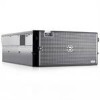Dell PowerEdge 2900 Hardware Owner's Manual (PDF) - Page 126
Troubleshooting a Diskette Drive, Turn off the system and attached peripherals
 |
View all Dell PowerEdge 2900 manuals
Add to My Manuals
Save this manual to your list of manuals |
Page 126 highlights
13 Perform the following steps: a Turn off the system and attached peripherals, and disconnect the system from its electrical outlet. b Open the system. See "Opening the System" on page 53. c Remove the memory cooling shroud. See "Removing the Cooling Shroud" on page 79. d Perform step d through step h in step 12 for each memory module installed. If the problem persists, see "Getting Help" on page 147. Troubleshooting a Diskette Drive Problem • Error message indicates a diskette drive problem. Action CAUTION: Only trained service technicians are authorized to remove the system cover and access any of the components inside the system. Before performing any procedure, see your Product Information Guide for complete information about safety precautions, working inside the computer and protecting against electrostatic discharge. 1 Enter the System Setup program and verify that the diskette drive is configured correctly. See "Using the System Setup Program" on page 35. 2 Remove the bezel. See "Removing the Bezel" on page 50. 3 Run the appropriate online diagnostic test. See "Using Server Administrator Diagnostics" on page 135. 4 Turn off the system and attached peripherals, and disconnect the system from the electrical outlet. 5 Open the system. See "Opening the System" on page 53. 6 Ensure that the diskette drive interface cable is securely connected to the diskette drive and the system board. 7 Ensure that a power cable is properly connected to the drive. 8 Close the system. See "Closing the System" on page 53. 9 Reconnect the system to the electrical outlet, and turn on the system and attached peripherals. 10 Run the appropriate online diagnostic test to see whether the diskette drive works correctly. 11 Turn off the system and attached peripherals, and disconnect the system from its electrical outlet. 12 Open the system. See "Opening the System" on page 53. 13 Remove all expansion cards installed in the system. See "Removing an Expansion Card" on page 70. 14 Close the system. See "Closing the System" on page 53. 15 Reconnect the system to the electrical outlet, and turn on the system and attached peripherals. 126 Troubleshooting Your System















